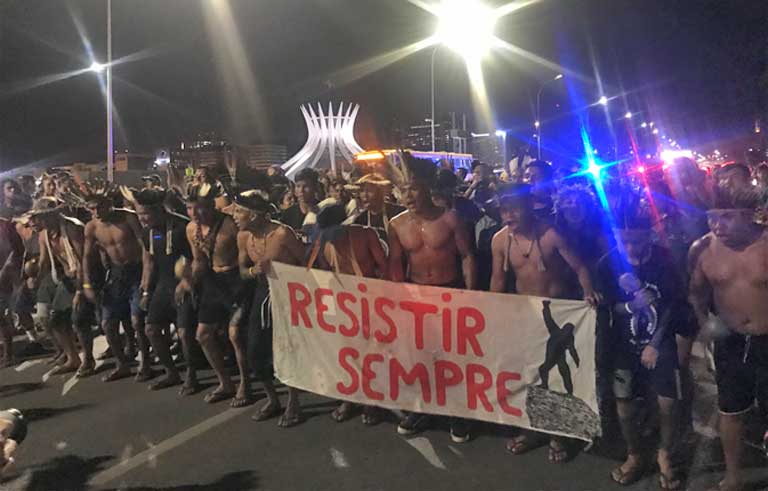
At their annual protest encampment in Brasilia from April 24-6, some 4,500 indigenous people from across Brazil marched on the Supreme Court building to oppose a recent ruling that could negatively impact demarcation of indigenous territory. The case concerned Provisional Measure 870, signed by President Jair Bolsonaro on his first day in office Jan. 1, shifting responsibility for indigenous reserve demarcation from FUNAI, Brazil’s indigenous agency, to the Agriculture Ministry. MP 870 was challenged as unconstitutional, but on April 24 Supreme Court Justice Roberto Barroso rejected that challenge—although he did agree that if the Agriculture Ministry failed to carry through with demarcation in future, further legal action could go forward at that time. During the three-day encampment, indigenous groups also protested Bolsonaro’s plan to open indigenous reserves to mining and agribusiness. The Free Land Encampment has been held in Brasilia every year since 2017. (Mongabay, April 26)





Indigenous protesters fire arrows in Brasilia
Several hundred indigenous Brazilians protested outside the Congress building in Brasilia on June 16 against a bill backed by the farm sector that would limit recognition of reservation lands.
Protesters wearing feathered headdresses and body paint later tried to invade the offices of the indigenous affairs agency FUNAI, accusing it for not defending their interests. Riot police fired pepper-spray to contain the crowd, and some arrows were shot at the glass windows of the building.
“This bill PL 490 is harmful not just to us, but to humanity,” Sonia Guajajara, head of Brazil’s largest indigenous umbrella organization APIB, told Reuters.
The legislation, first tabled in 2007, would fix 1988 as the cut-off date for the demarcation of titled indigenous lands if they were not occupied at that time. The lower house is expected to vote on the bill in committee next week.
PL 490 is among a raft of measures to roll back indigenous land rights in recent years.
Indigenous protesters clash with police in Brasília
Indigenous protesters armed with bows and arrows clashed with police outside Brazil’s Congress, leaving the area enveloped in tear gas and leading lawmakers to suspend debate on a controversial land reform bill.
Activists said two indigenous people were hospitalized with severe injuries, and a dozen more sustained light injuries in the clashes, while the congressional press office said at least three police officers were wounded with arrows.
The press office said around 500 protesters tried to “invade” one of the entrances to Congress, and that police responded with tear gas, stun grenades and pepper spray after coming under attack with arrows. (AFP)
New indigenous protest mobilization in Brasília
Thousands of indigenous people have been protesting in Brasília ahead of an expected Supreme Court decision that could have far-reaching implications for land rights. Judges will consider a lower court ruling to accept a cut-off date of 1988 for land claims by indigenous groups, which is backed by the powerful agricultural sector. President Jair Bolsonaro has regularly said indigenous communities occupy too much land and is encouraging legislation that would facilitate mining and farming in the Amazon. (TNH)